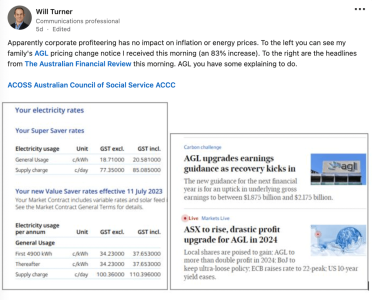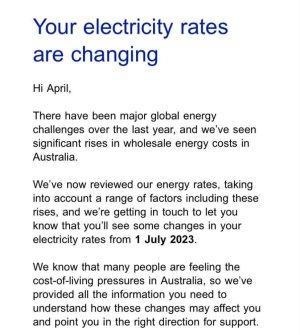Prepare for a shock! Some Aussies are experiencing a massive 83% surge in power bills
- Replies 40
Keeping a close eye on our energy consumption and bills is a critical part of managing our finances and household budget. However, recent reports show that Aussie seniors are in for quite a shock as some power bills are expected to rise by up to a staggering 83 per cent. Before you dust off your candles and settle in for the long haul, let's take a closer look at why this is happening and how you can save on energy costs.
Judy Saunders, an AGL customer from Ashfield in Sydney's Inner West, was left stunned when she received an email from her power company informing her of a new electricity rate she would be charged from July 1.
'It was 51 per cent more than what I'm paying now - I just couldn't believe it,' she told reporters.
Judy had been on a single-rate plan for the previous 12 months after her family moved back into their newly renovated home. Unfortunately, the seemingly cheap rate she enjoyed might have been too good to last. From July, her electricity rates will surge from 16.5 cents per kilowatt hour to 24.98. A credit of 5 cents per kilowatt hour will be given for unused solar energy sent back to the grid.
‘As the cost of living went up, I started shopping around, and every time I went to one of those comparison websites, the usual response was you are getting it better than anywhere else, stick with what you have got.’ she explained.
‘So that's what I did, but now obviously all my good luck has run out.’
When Judy shared her story on a community Facebook page, she discovered she wasn't alone in being affected by the price hike. A fellow Sydneysider, Ashlah, revealed her rates with power company Alinta would be 56 per cent higher from July 1.
'My last bill was $595, these new rates would make the same bill cost me $900. It's insane,' she wrote.
‘They called me today too! To tell me how they are going to offer me a special deal, I compared the rates they are quoting me versus what I'm paying now and it's 38 per cent more, it's like: sorry I'll pass on your special deal!’ another AGL customer commented.
However, the worst seems to be the AGL customer who received a shocking 83 per cent hike to his power rates.
So, why are our power bills skyrocketing? Last month, the Australian Energy Regulator (AER) confirmed electricity prices will increase between 20 and 25 per cent from July 1 for about 600,000 customers.
This decision primarily impacts those in NSW, south-east Queensland, and South Australia on the default market offer (DMO) over the coming financial year.
AER chair Clare Savage acknowledged the need to balance cost-of-living pressures with retailers' reasonable cost recovery, stating that 'it's important the DMO provides a safety net for those who might not have shopped around for a better power deal’.
For customers in NSW, AGL variable rate customers can expect increases starting at 29.7 per cent (about $540 per year).
In response to Judy's complaint, AGL cited 'significant rises in wholesale energy costs in Australia' as a reason for the increase. A spokesperson mentioned their understanding of the pressure higher energy prices put on households and businesses amidst the broader cost of living pressures in Australia.
They added, 'Our decision to increase prices for our market contract customers is based on a detailed consideration of a range of factors including wholesale prices, network charges, retail operating costs, customer affordability, and the value we offer to our customers.'
Now, let's discuss some energy-saving tips for seniors to reduce their overall energy consumption and save money on their bills:
1. Use energy-efficient appliances and make the most of natural light and ventilation in your home.
2. Switch off appliances at the power point when not in use or consider investing in a standby power controller to automatically turn off devices in standby mode.
3. Set your heating or air conditioning to a comfortable yet energy-efficient temperature and consider using fans before resorting to air conditioning.
4. Install or upgrade insulation in your home to help maintain a comfortable indoor temperature without overworking your heating or cooling systems.
5. Time your energy usage during off-peak hours, especially for energy-intensive tasks like washing clothes and using the dishwasher.
In addition to energy-saving tips, seniors should also be aware of any available discounts, rebates, or government programs. For instance, the Australian Government offers the Energy Supplement, which provides financial assistance to help eligible Australians meet energy costs. State governments also offer various concessions and rebates, so contact your energy company or state government to check which benefits you may be eligible for.

Judy's family has taken steps towards smart electricity usage by running the washing machine and the tumble dryer during the day and using the solar power they are producing.
We encourage our members to stay well-informed and proactive in reducing energy consumption and seeking better rates in the market when possible. Together, let's work towards a more budget-friendly, energy-efficient future.
Have you received an updated bill? Let us know in the comments section below.
Judy Saunders, an AGL customer from Ashfield in Sydney's Inner West, was left stunned when she received an email from her power company informing her of a new electricity rate she would be charged from July 1.
'It was 51 per cent more than what I'm paying now - I just couldn't believe it,' she told reporters.
Judy had been on a single-rate plan for the previous 12 months after her family moved back into their newly renovated home. Unfortunately, the seemingly cheap rate she enjoyed might have been too good to last. From July, her electricity rates will surge from 16.5 cents per kilowatt hour to 24.98. A credit of 5 cents per kilowatt hour will be given for unused solar energy sent back to the grid.
‘As the cost of living went up, I started shopping around, and every time I went to one of those comparison websites, the usual response was you are getting it better than anywhere else, stick with what you have got.’ she explained.
‘So that's what I did, but now obviously all my good luck has run out.’
When Judy shared her story on a community Facebook page, she discovered she wasn't alone in being affected by the price hike. A fellow Sydneysider, Ashlah, revealed her rates with power company Alinta would be 56 per cent higher from July 1.
'My last bill was $595, these new rates would make the same bill cost me $900. It's insane,' she wrote.
‘They called me today too! To tell me how they are going to offer me a special deal, I compared the rates they are quoting me versus what I'm paying now and it's 38 per cent more, it's like: sorry I'll pass on your special deal!’ another AGL customer commented.
However, the worst seems to be the AGL customer who received a shocking 83 per cent hike to his power rates.
So, why are our power bills skyrocketing? Last month, the Australian Energy Regulator (AER) confirmed electricity prices will increase between 20 and 25 per cent from July 1 for about 600,000 customers.
This decision primarily impacts those in NSW, south-east Queensland, and South Australia on the default market offer (DMO) over the coming financial year.
AER chair Clare Savage acknowledged the need to balance cost-of-living pressures with retailers' reasonable cost recovery, stating that 'it's important the DMO provides a safety net for those who might not have shopped around for a better power deal’.
For customers in NSW, AGL variable rate customers can expect increases starting at 29.7 per cent (about $540 per year).
In response to Judy's complaint, AGL cited 'significant rises in wholesale energy costs in Australia' as a reason for the increase. A spokesperson mentioned their understanding of the pressure higher energy prices put on households and businesses amidst the broader cost of living pressures in Australia.
They added, 'Our decision to increase prices for our market contract customers is based on a detailed consideration of a range of factors including wholesale prices, network charges, retail operating costs, customer affordability, and the value we offer to our customers.'
Now, let's discuss some energy-saving tips for seniors to reduce their overall energy consumption and save money on their bills:
1. Use energy-efficient appliances and make the most of natural light and ventilation in your home.
2. Switch off appliances at the power point when not in use or consider investing in a standby power controller to automatically turn off devices in standby mode.
3. Set your heating or air conditioning to a comfortable yet energy-efficient temperature and consider using fans before resorting to air conditioning.
4. Install or upgrade insulation in your home to help maintain a comfortable indoor temperature without overworking your heating or cooling systems.
5. Time your energy usage during off-peak hours, especially for energy-intensive tasks like washing clothes and using the dishwasher.
In addition to energy-saving tips, seniors should also be aware of any available discounts, rebates, or government programs. For instance, the Australian Government offers the Energy Supplement, which provides financial assistance to help eligible Australians meet energy costs. State governments also offer various concessions and rebates, so contact your energy company or state government to check which benefits you may be eligible for.
Key Takeaways
- Aussie customers have been left in shock after being informed of massive hikes to their electricity rates next month, with some facing increases of up to 83 per cent.
- AGL customer Judy Saunders, from Ashfield in Sydney's Inner West, said she was stunned when she received an email from the power company informing her of the new electricity rates she would be charged from July 1.
- The Australian Energy Regulator (AER) confirmed last month that electricity prices will increase between 20 and 25 per cent from July 1 for about 600,000 customers.
- AER chair Clare Savage said that the regulator had to balance the cost-of-living pressures customers faced with the need for retailers to recover reasonable costs.
Judy's family has taken steps towards smart electricity usage by running the washing machine and the tumble dryer during the day and using the solar power they are producing.
We encourage our members to stay well-informed and proactive in reducing energy consumption and seeking better rates in the market when possible. Together, let's work towards a more budget-friendly, energy-efficient future.
Have you received an updated bill? Let us know in the comments section below.











